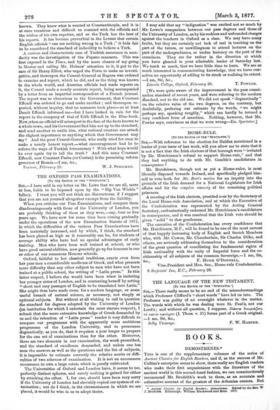THE OXFORD PASS EXAMINATIONS.
[TO THE EDITOR OP THIS SPECTATOR.") Sim,—I have said in my letter on Mr. Lowe that we are all, more or less, liable to be imposed upon by the "Rip Van Winkle" fallacy. I trust you will not think me discourteous, if I suggest that you are not yourself altogether exempt from the liability.
When you criticise our Pass Examinations, and compare them disadvantageously with those of the University of London, you are probably thinking of them as they were,—say, four or five years ago. We have now for some time been coming gradually under the operations of the new Examination Statute of 1872, in which the difficulties of the various Pass Examinations have been materially increased, and by which, I think, the standard has been placed as high as it reasonably can be, for students of average ability who have had no special advantages of early training. Men who have been well trained at school, or who have good natural abilities, now generally go up for honours in one or other of our numerous Honour schools.
Oxford, faithful to her classical traditions, exacts even from her pass men a considerable modicum of Greek, and what presents more difficulty than any other subject to men who have not been trained at a public school, the writing of "Latin prose." In this latter respect, I believe she would have been wiser in imitating her younger sister of London, and in contenting herself by setting "short and easy passages of English to be translated into Latin." She might thus have made room for a modern language, or some useful branch of natural science, as necessary, not simply as optional subjects. But without at all wishing to call in question the standard for degrees adopted by the University of London (an institution for which I entertain the most sincere respect), I submit that the more extensive knowledge of Greek demanded by us and the retention of "Latin prose" render it very difficult to compare our programme with the apparently more ambitious programme of the London University, and to pronounce dogmatically, as you do, that it requires a year longer to prepare for the one set of examinations than for the other. Moreover, there are two elements in our examination, the work prescribed, and the standard of excellence demanded, and unless one has seen the answers as well as the questions and the list of subjects, it is impossible to estimate correctly the relative merits or diffi- culties of two schemes of examination. It is not an uncommon occurrence to own a large estate which is poorly cultivated.
The Universities of Oxford and London have, it seems to me, perfectly distinct spheres, and surely nothing is gained for either by attacking the other. I, for one, should have been very sorry if the University of London had slavishly copied our system of ex- amination; nor do I think, in the circumstances in which we are placed, it would be wise in us to adopt theirs. I may add that my " indignation " was excited not so much by Mr. Lowe's comparison between our pass degrees and those of the University of London, as by his reckless and unfounded charges against the teachers in Oxford as a class. We may have many faults, but they are certainly not lack of zeal in teaching on the part of the tutors, or unwillingness to attend lectures on the part of the undergraduates, or undue leniency on the part of the examiners. They are far rather in the direction at which you have glanced in your admirable leader of Saturday last. We teach so much, that we have little time to learn. We are se much interested in communicating knowledge, that we leave our- selves no opportunity of adding to its stock or realising its extent. —I am, Sir, &c., Lincoln College, Oxford, February 26. T. FOWLER.
[We were quite aware of the improvement in the pass exami- nation standard of recent years, and were referring to the modern standard, not to the old one. We did not speak " dogmatically " on the relative value of the two degrees, on the contrary, but doubtfully, prefacing our estimate by the words, "we might perhaps say, speaking roughly," which can hardly be termed a very confident form of assertion. Nothing, however, that Mr. Fowler says, convinces us that we were wrong—En. Spectator.]


































 Previous page
Previous page